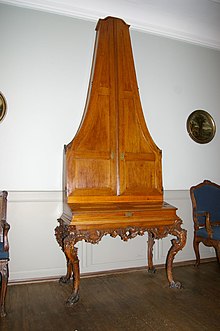Christian Ernst Friederici
Christian Ernst Friederici (also Friderici) (born March 7, 1709 in Meerane ; † May 4, 1780 in Gera ) was a German organ and piano builder .
Life
Christian Ernst Friederici was the son of Johann Friederici (1654–1731), who was town clerk, deputy mayor and also organ maker in Meerane. Christian Ernst Friederici received his training as an organ builder from the organ builder Gottfried Silbermann in Freiberg, Saxony . He then perfected his skills in the position of organ building assistant with the organ builder Heinrich Gottfried Trost in Altenburg in Thuringia.

Around 1737 he founded a piano and organ building company in Gera . His brother Gottfried Christian (1714–1777) also joined this group in 1744. The workshop developed into one of the most famous of its kind in Germany in the 18th century. About 50 organ works were created. Friederici carried the title of "Duke of Gotha and Altenburg court and country organ builder". Friederici also invented a special organ part, the so-called nightingale strike (Don). Such natural voice imitations were popular in the Baroque era, but are rarely used today.
His innovations in the field of piano construction are much more extensive. In 1745 he built the first upright fortepiano , called the "pyramid". It was the beginning of the development of the vertical grand piano, which was popular at the beginning of the 19th century and which later led to the pianino . From 1758 onwards, Friederici began producing small, rectangular pianos, which he called “Fortbiens”. The table pianos, which were widespread until the second half of the 19th century, developed from this . The attempt to create a kind of vibrato ("Bebung") for the harpsichord was also reported in 1761.
The customers of the Friedericis workshop included Philipp Emanuel Bach , Leopold Mozart and the Goethe family in Frankfurt am Main . So Wolfgang Amadeus Mozart and Johann Wolfgang von Goethe learned to play the piano on a Friederici instrument.
Preserved works
- Organ positive in the church in Gera-Weißig , built in 1740 for the castle chapel in Lichtenstein / Sa. , in the church in Weißig since 1801.
- Organ with 15 (12-3) registers, built in 1754 for the church in Cröbern near Leipzig. Since this church had to be demolished at the end of the 1960s due to lignite mining , the organ was moved to the Katharinenkirche in Großdeuben in 1973 .
- Pyramid wing, 1745, Brussels , Conservatory instrument collection
- Pyramid wing, 1745, Frankfurt am Main, Goethe House
- Pyramid wing, 1750, Bamberg, piano historical collection of the Neupert piano factory
- Clavichord , 1772, Vienna, Historical Museum
proof
- ^ Hanns Neupert: Friederici, Christian Ernst. In: New German Biography (NDB). Volume 5, Duncker & Humblot, Berlin 1961, ISBN 3-428-00186-9 , p. 449 f. ( Digitized version ).
- ^ Moritz Fürstenau : Friederici, Christian Ernst . In: Allgemeine Deutsche Biographie (ADB). Volume 7, Duncker & Humblot, Leipzig 1877, p. 392.
- ^ Report and picture on Orgelbau Rühle's website , accessed on January 7, 2012
- ^ Organ portrait on the Orgelstrasse Leipziger Land website , accessed on January 7, 2012.
Web links
- Literature by and about Christian Ernst Friederici in the catalog of the German National Library
| personal data | |
|---|---|
| SURNAME | Friederici, Christian Ernst |
| ALTERNATIVE NAMES | Friderici, Christian Ernst |
| BRIEF DESCRIPTION | German organ and piano builder |
| DATE OF BIRTH | March 7, 1709 |
| PLACE OF BIRTH | Meerane |
| DATE OF DEATH | May 4, 1780 |
| Place of death | Gera |